Lefkada in 72 Hours: What to Do, See,...
From traditional dances and global rhythms...
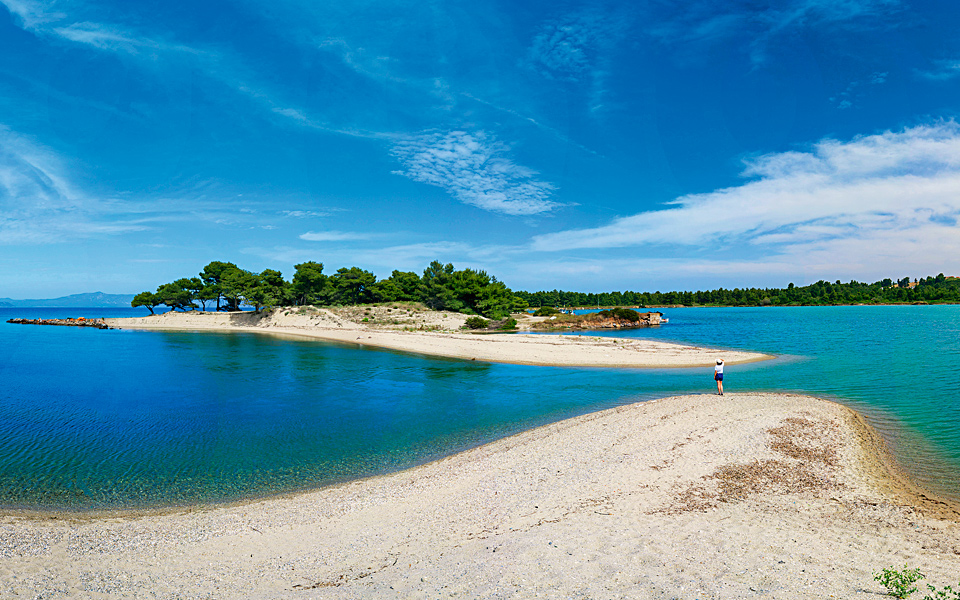
The bay of Glarokavos is ideal for a swim, for water sports, as well as a good place for fishing boats and sailboats to drop anchor.
© Perikles Merakos
Yes, Halkidiki may be one of the regions in Greece where mass tourism has changed the local way of life – for better and for worse, but there are still places where life goes on as normal. One of the areas unaffected by tourism is the village of Varvara. The simple yet lively settlement is surrounded by forest and waterfalls.
Greece has the second highest number of Blue Flag-awarded beaches in the world, and Halkidiki is the regional unit with the most flags in the country; 85 were awarded to the area’s beaches this year.
Ierisos, Kampos, Kampoudi, Nea Roda, Olympiada, and Ouranoupoli in the Aristotelis Municipality; Armenistis, Lagomandra, Marmaras, Platanitsi, Porto Carras, and Sykia on the Sithonia Peninsula; Sani Dunes, Athytos, Paliouri Kanistro, Fourka, and Mola Kalyva on the Kassandra Peninsula; Gerakini and Sargani in the Polygyros Municipality; Agios Mamas, Nea Potidea, Triglia and Flogita in the Nea Propontida Municipality, are just some of them.
Another three flags were also awarded to marinas in the area, and one was awarded to sustainable boating tourism operator Scorpion Yachting MCPY/All Inclusive.
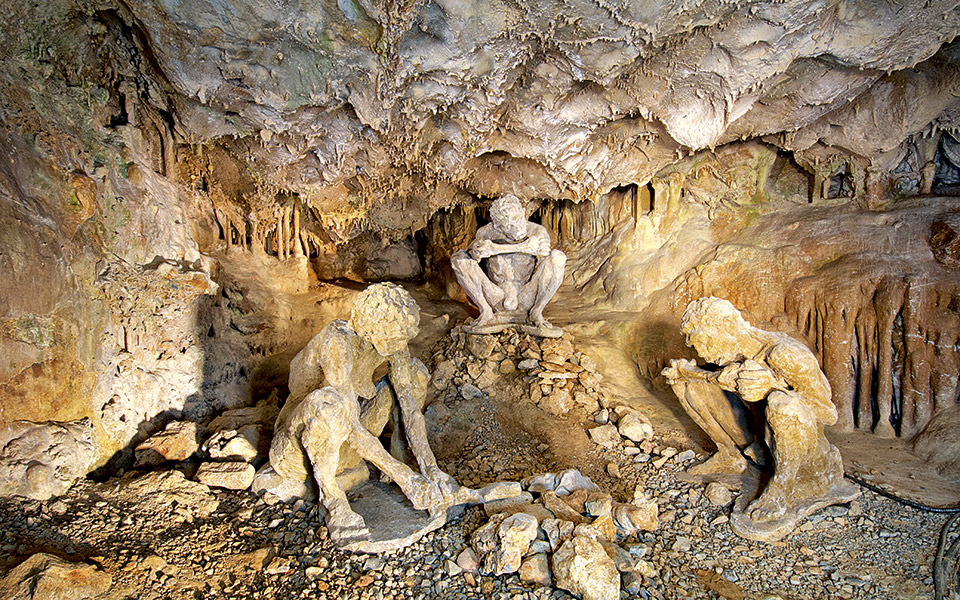
The discovery of a fossilized human skull plus many other object led to the Petralona Cave being called the Parthenon of paleontology
© Ephorate of Palaeoanthropology and Speleology of Southern Greece/Hellenic Republic, Ministry of Culture and Sports/Archaeological Receipts Fund
His age is uncertain; some say he’s 300,000 years old, others say he’s as old as 700,000 years. In any case, his existence is of great importance for anthropology. Morphologically and chronologically, the Petralona Man places somewhere between Homo erectus and Homo sapiens.
His remains were found in the 10,400 m2 Cave of Red Stones, also known as the Petralona Cave, located 1,5 kilometers from the village of Petralona in northwestern Halkidiki. Through time, many animals – some now extinct or long gone from this part of the world – sought shelter in the cave. Aside from the hominid, bones from bears, Mosbach wolves, rhinos, Perrier hyenas, panthers, lions, and more, have been found and can be seen in the cave.
The cave is currently closed for works, sponsored through EU funds, expected to be completed within two to three years.
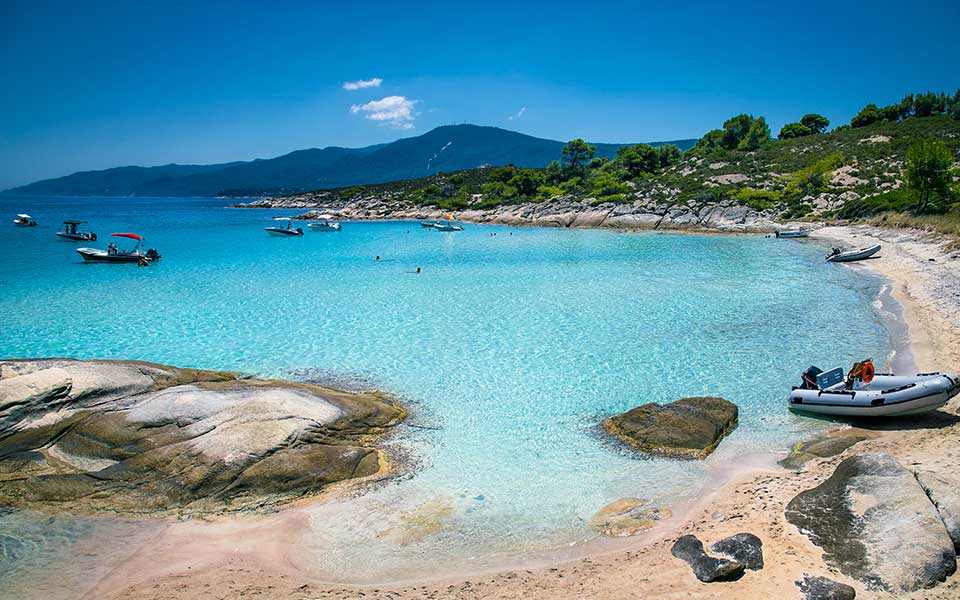
Diaporos
© Shutterstock
The largest of a cluster of small islands opposite Vourvourou is a little paradise (as is this whole area) with its clear blue waters and light-colored sand. In the past the island was a well-kept secret. Now almost everyone vacationing on the Sithonia peninsula pays it a visit for a day of swimming, kayaking, fishing or boat excursions (both drivers and swimmers are advised to be careful to avoid accidents).
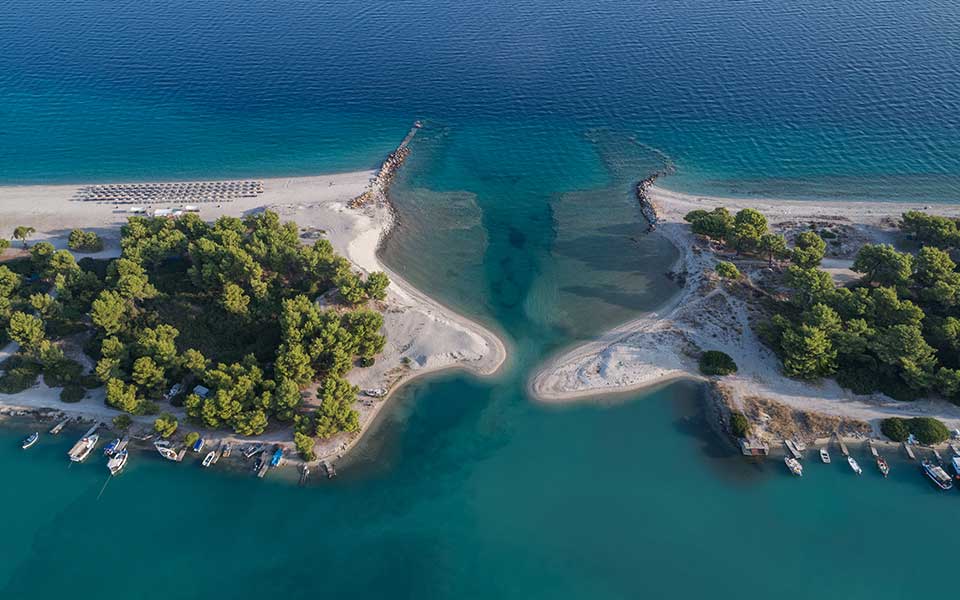
Aerial view of Glarokavos beach in Kassandra peninsula.
© Shutterstock
Legend has it that Enceladus, along with the other giants who were born here, eventually lost the Gigantomachy – a battle with the Olympian gods for control of the cosmos. Some legends say that the goddess Athina defeated Enceladus with a rock, which formed the island of Sicily. Others say he is buried under the Kassandra peninsula, and that his attempts to get out are what create the occasional earthquake.
If Enceladus were to ever get out, he might not recognize much on the Kassandra peninsula. Actually, not even the name. The place where the giants were born and fought the gods of Olympus, was once called Flegra. You’ll notice the name on local businesses and hotels.
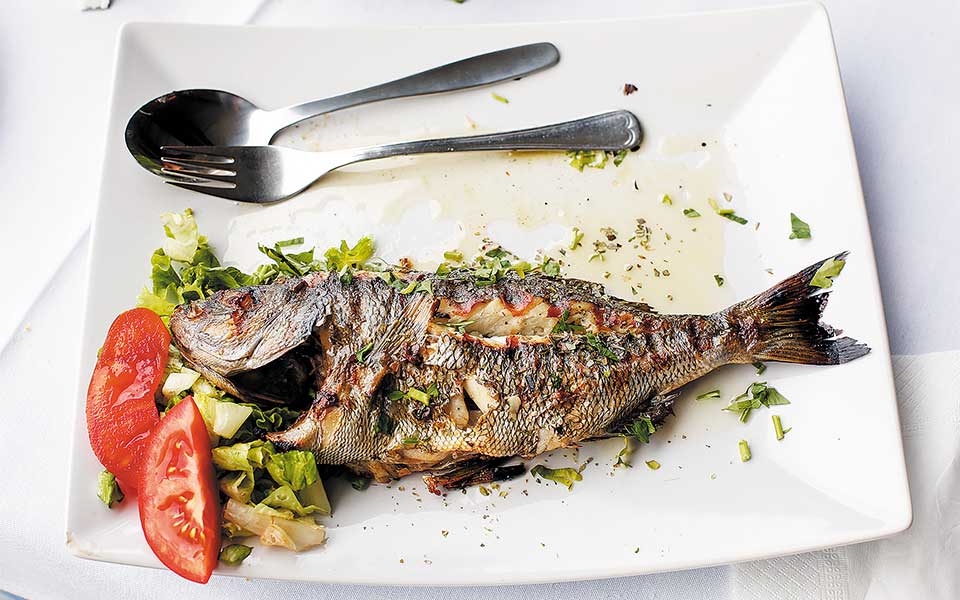
© Nikos Kokkas
For the best fish, head to the villages of Pontiada, Neos Marmaras, Vourvourou, Ormos Panagias, Sykia, Pyrgadikia, Ammouliani and Ierissos. In Ammouliani, only the day’s catch is considered fresh. Yesterday’s fish is considered old, and two-day old leftovers are turned into fish cakes. In Ierissos, ask for “orkini” – a kind of small tuna.
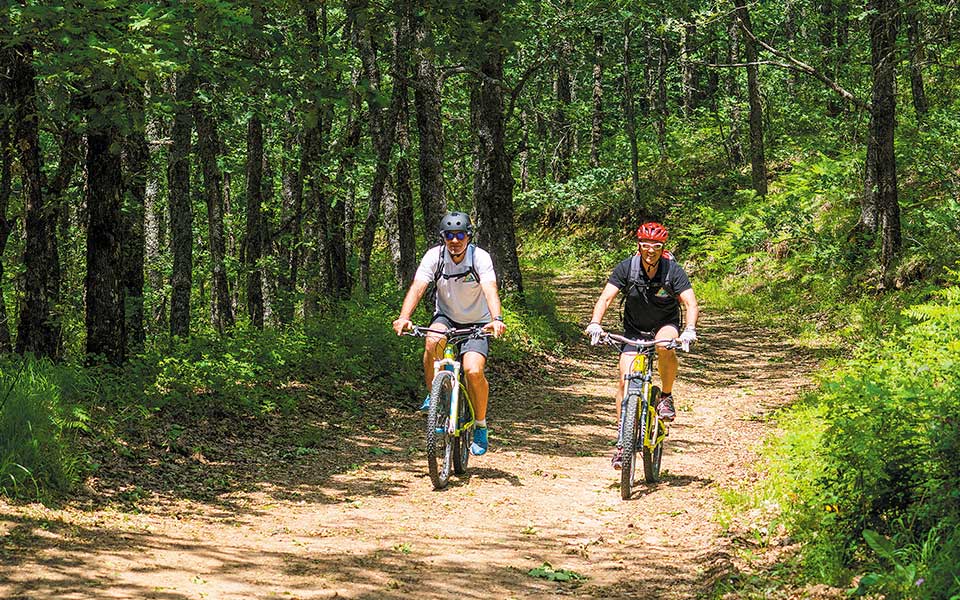
© Perikles Merakos
The holy trinity of the tourism industry: sea, sun and sand, are defining factors of Halkidiki. Thanks to the sunny weather and the incredible beaches, Halkidiki seems destined to remain a major draw for many years to come.
Some, of course, consider this type of tourism outdated, as the industry moves towards more substantial experiences which allow visitors to get to know a destination and its people in a deeper way. For such travelers, hiking and cycling trips on Mount Holomondas, excursions to religious places of interest, and gastronomic events in eastern Halkidiki make for great additions to the days at the beach.
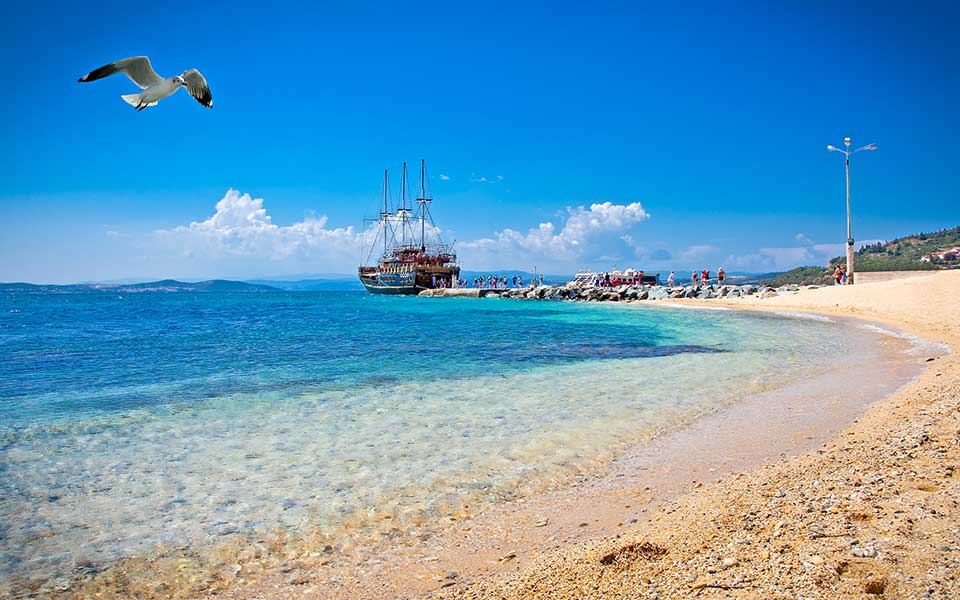
Ouranoupolis beach
© Shutterstock
Compared to other villages in Halkidiki, Ierissos is lesser-known, remote and somewhat isolated. In other words, it’s the perfect escape for those who have had enough of the beach bars on the Sithonia and Kassandra peninsulas. Those heading to the monasteries of Mount Athos should make a stop at the town’s cultural center (Tel. +30 23770.211.30), where you can see a 3D film about the monastic community.
If you go as far as Tripiti, located between Ouranoupolis and Nea Roda, it’s worth taking the ferry over to Ammouliani. The small island is renowned for its fish and its beautiful beaches. Swim at Alikes, Megali Ammos, Agios Giorgios or Karagatsia. There are snack and beach bars, and there’s also a campsite here (Alikes camping, Tel. +30 23770.513.79).
Tickets to the island are cheap (€2.50 per passenger and €10 to bring a car).
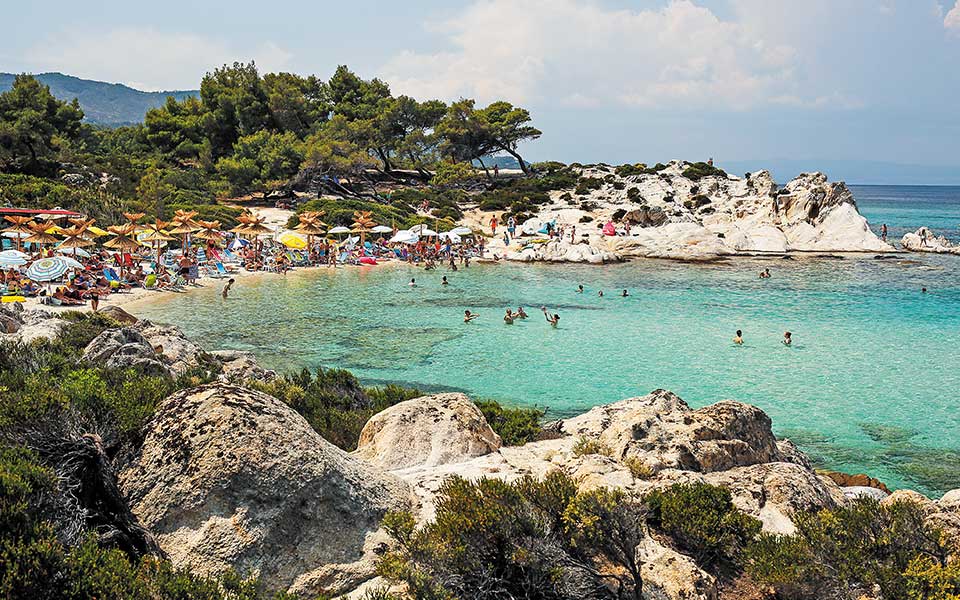
Kavourotrypes
© Nikos Kokkas
Another unique place to swim is Kavourotripes. This beach, whose name translates to “crab holes”, differs greatly from the sandy expanses you usually find around Halkidiki. Here, between Armenisti and Sarti, softly shaped grey-white rocks form a series of small bays.
The fame of this beach has made it slightly less enjoyable in high season, due to the crowds, but the season here is also longer than at other local beaches. When the rest of Halkidiki is just starting to awake from winter hibernation, Kavourotripes is already bustling.
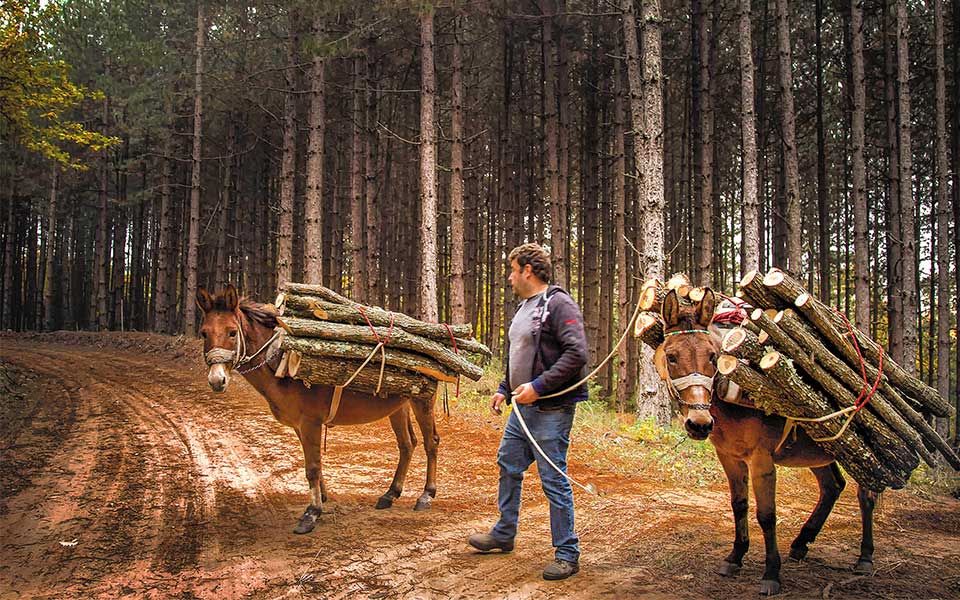
© Perikles Merakos
Like some sort of secret heroes, the life of the local lumberjacks is one far from the fun and leisure of the beaches; in the forested areas of Arnea, Taxiarchis, Paleohori and Neohori on Mount Holomondas, they work surrounded by oaks, beech, pines and fir trees (the last of which are sold as Christmas trees).
No trip to Halkidiki would be complete without a visit to Olympiada, 35 kilometers from Ierissos, to enjoy some of the region’s famous mussels.
Many places in Halkidiki, such as Nea Roda, Nea Moudania and Nea Kallikratia were named for the hometowns of the refugees from Asia Minor and Eastern Thrace, who set up their new life here. “Nea” means new.
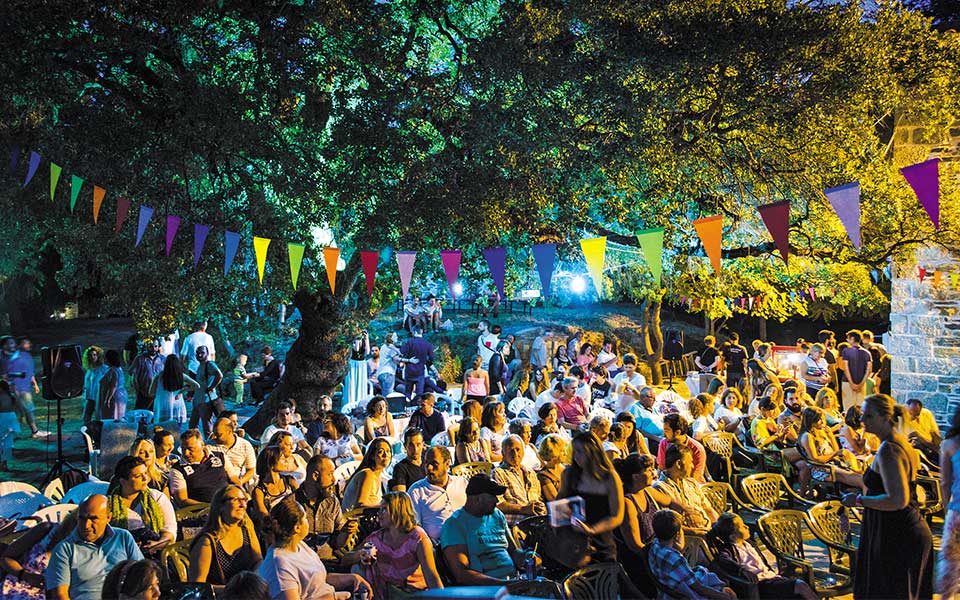
There aren’t many open-air cinemas in Halkidiki yet, unfortunately, but there are a few places where you can watch films under the stars: Cine Kleio (Tel. +30 698.030.3578) in Nea Moudania opened on June 15, with a screening of the animated How to Train Your Dragon 3.
Cine Antigoni (+30 23710.525.35), between Gerakini and Kalives also screens children’s movies on Mondays and Thursdays, as well as new movies and films that premiered over the winter.
On July 5-7, the fifth Parthenon Film Festival, featuring screenings of Greek films, will take place in the village of Parthenonas, on the Sithonia peninsula. Entrance is free.
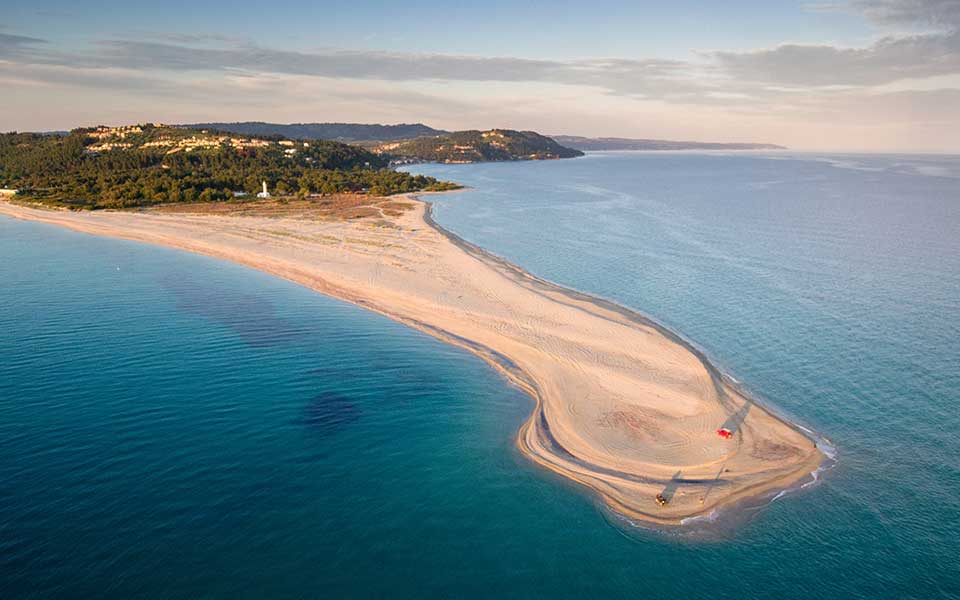
Possidi Cape Beach in Kassandra peninsula.
© Shutterstock
Similar to a party planned at the last minute, tourism on the Kassandra peninsula was allowed to grow unregulated and a bit out of control. Still, a lot of the region’s beauty remains. Two of the most beautiful places on the peninsula are the Possidi Cape on the west side, known for its iconic lighthouse from 1864 and popular with amateur fishermen, and Pefkohori on the east side. The latter, featuring the Glarokavos lagoon and picturesque caiques tied to wooden docks, will make you feel like you’ve traveled back in time, to a Kassandra of yesteryear.
The municipal thermal spa of Aghia Paraskevi (Tel. (+30) 23740.713.58), on the Kassandra peninsula, is a haven for spa lovers. The water here is beneficial for people with bone and joint ailments, discopathy, tendinitis, neck problems and psoriasis.
The swimming pools (outdoor and indoor) have been recently renovated, and the hammam, sauna, whirlpool and individual bath tubs are set for renovations this year. Some pampering treatments to get here include the Magic Honey massage, which hydrates the skin, and the Aroma of Greece massage with ouzo, which relaxes the muscles.
The mineral water has a temperature of 34-36°C, and its therapeutic properties start working wonders after ten 30-40-minute swims. It is recommended to visit your doctor for a checkup before visiting the spa. The spa is open every day from 09:00 to 21:00.
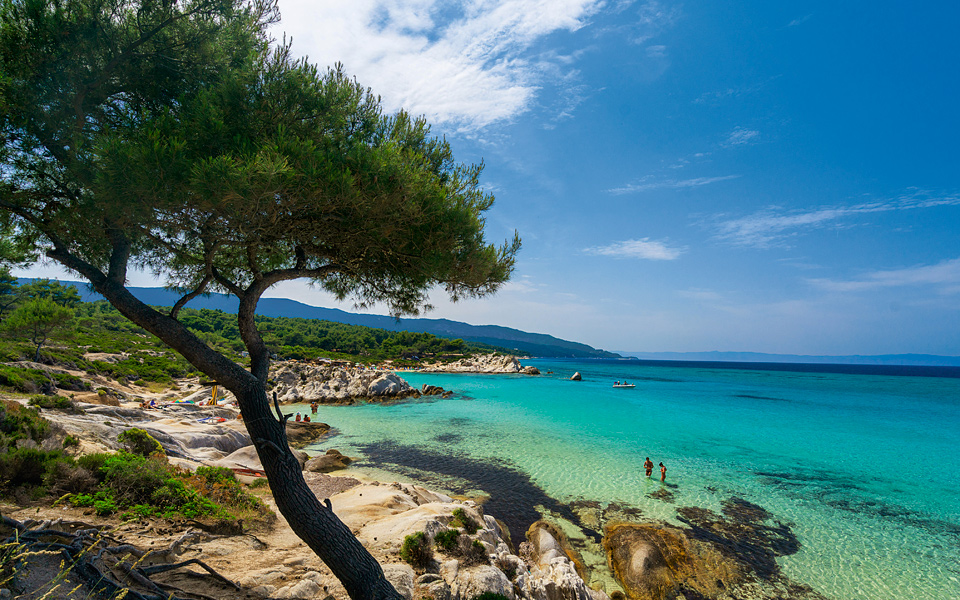
Kavourotrypes at Sithonia
© Perikles Merakos
It’s really the only way to discover all that Halkidiki has to offer. Exploring the 2,923 km2 by car will take you through forests, up mountains and to waterfalls, monasteries, the region’s famous towers, traditional stone-built villages, and fantastic tavernas, and you’re not restricted to the peninsula where you’ve chosen to spend your nights.
There are sights worth visiting spread all around Halkidiki, so prepare to spend some time behind the wheel. If you begin your trip in Kallithea on the Kassandra peninsula, for example, it’s an 80-kilometer drive to Vourvourou on the Sithonia peninsula, a 115-kilometer drive to Ouranopouli and a 110-kilometer drive to Varvara.
Each of the Halkidiki peninsulas has its own character. Sithonia, located in the middle, between the busy Kassandra and the pious Athos, attracts mainly nature lovers and campers. People from all over northern Greece arrive here with their campers in June, and don’t move them again until September. All types of camping are represented here, from glamping-type bungalows fitted with the latest technology, to 80s-style campsites with plastic outdoor furniture.
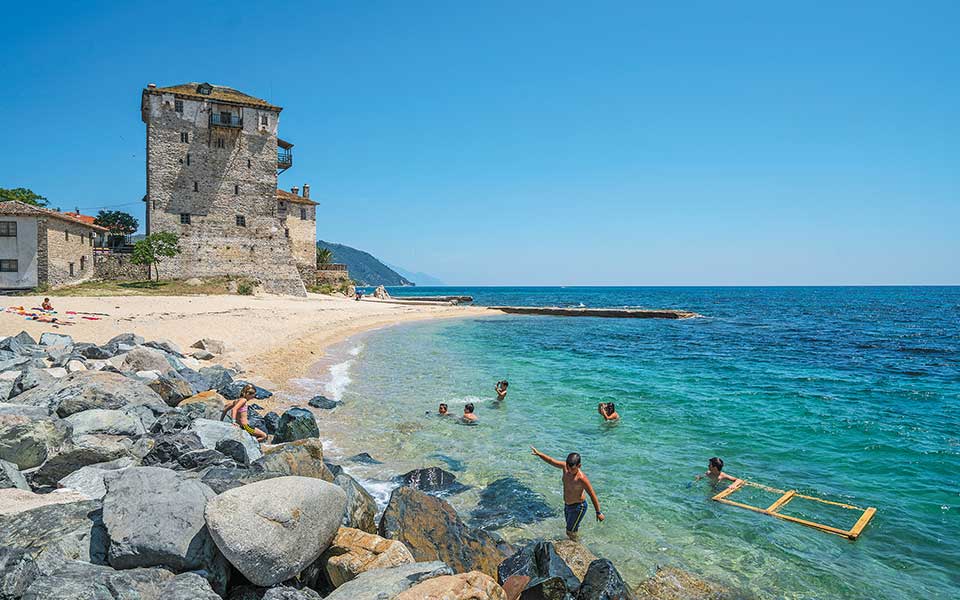
© Perikles Merakos
The towers of Galatista, Krounas in Ierissos, Sanis, Nea Fokea, and of course, the famous Prosforios Tower in Ouranopoli, are all worth a visit. The latter, in particular, is a memorable experience. Estimated to date as far back as the 12th century, it stood on land owned by the Vatopedio Monastery, known as Prosferion – hence its name.
This year, the tower is hosting an exhibition featuring ancient artifacts discovered in northeastern Halkidiki (prehistoric vases, helmets retrieved from a wreck from Classical Greece, jewelry and more), and exhibits from the Zygos Monastery. Opening hours are 08:30-16:00 every day except Tuesday. Admission costs €2.
Ephorate of Antiquities of Halkidiki and Mount Athos: Tel. (+30) 23102.851.63.
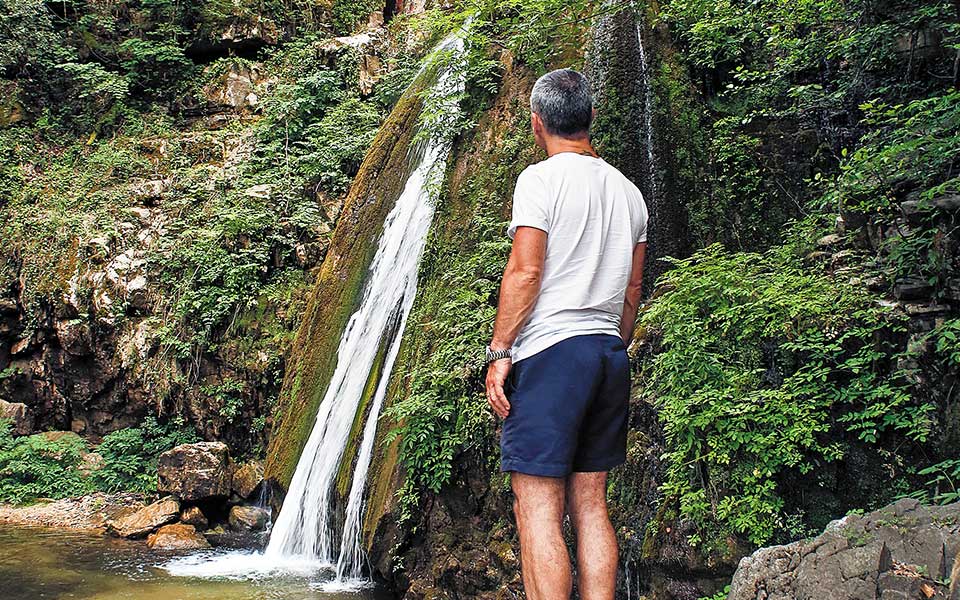
The waterfalls of Varvara
© Nikos Kokkas
There’s nothing quite like midnight dips after dancing in the sand, and there ain’t no beach party like a Halkidiki beach party. The parties at Armenistis Camping on the Sithonia peninsula feature guest DJs and dance performances (the street dance festival Battle of the Best will take place on June 27-30).
There aren’t that many traditional villages in Halkidiki, but Varvara isn’t the only one. Places like Nikiti and Parthenonas on the Sithonia peninsula, Arnaia in the interior, and Afitos on the Kassandra peninsula remain simple and authentic, and are beloved by the locals for it.
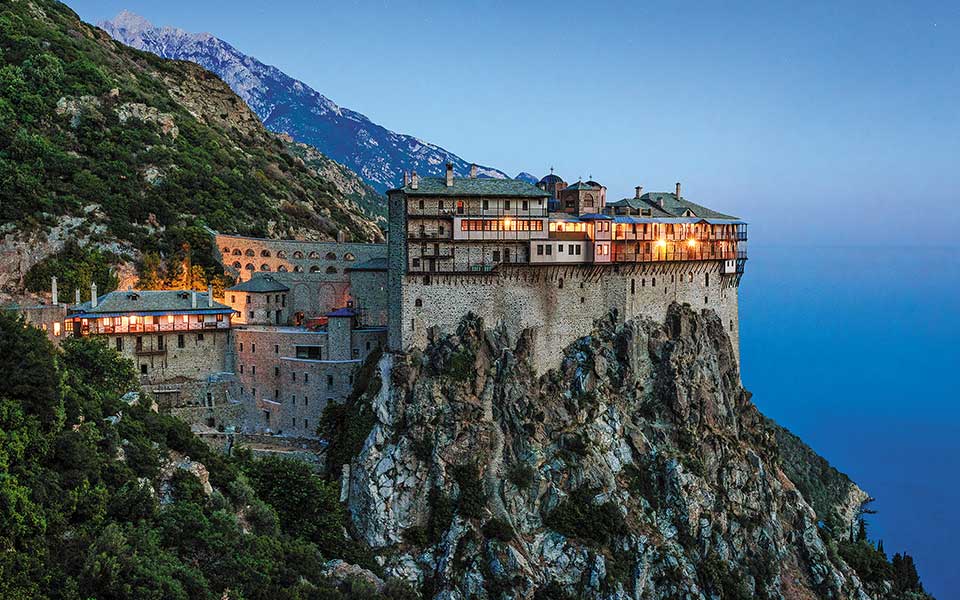
© Hartmur Krinitz/Laif
The Monastic State of Mount Athos is a unique place of sanctuary for monks, and a popular pilgrimage destination, although only men are allowed to enter.
There are 20 monasteries on Mount Athos, including the monasteries of Agios Pandeleimonos, Dochiariou, Xenophondos, Xiropotamou, Simonos Petras, Osiou Gregoriou, Agios Dionysios and Agios Pavlos, among others.
While women aren’t allowed to visit the monasteries, they can be seen from the sea on a boat trip around the Holy Mountain. The boats leave from Ouranoupolis (Athos Sea Cruises, Tel. 23770.716.06 / Calypso Cruises Tel. +30 23770.714.20). Buy a couple of bread rings to bring along – one for you, and one to feed the company of seagulls following the boat.
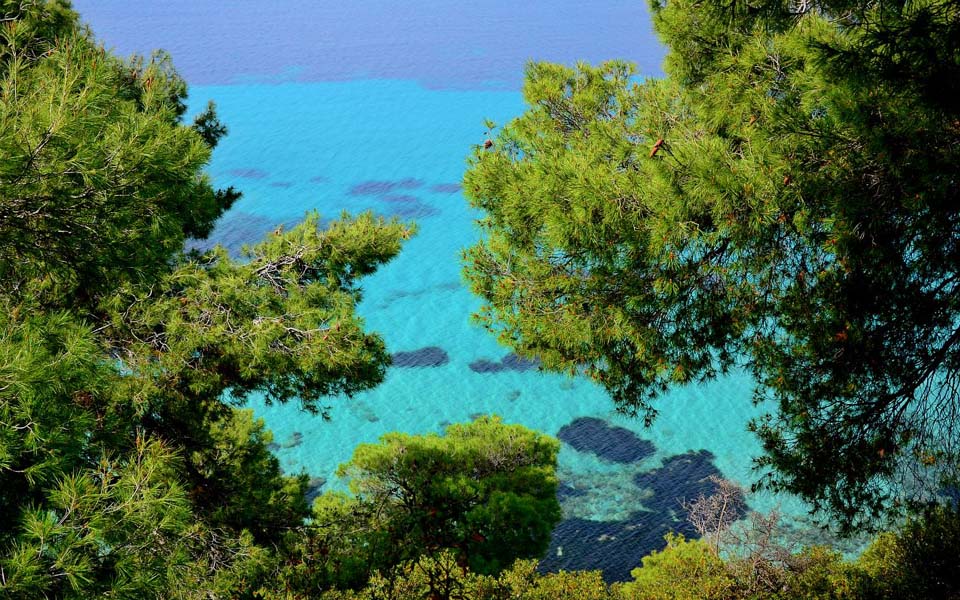
Fans of Halkidiki will tell you that once you've seen nature like this, no where else compares.
At the very interesting (if somewhat understaffed), Arnaia Weaving Museum (Mouseio Yfantikis Arnaias. Yfanta=Woven), the exhibits – rugs and carpets with beautiful ornate designs along with traditional tools – tell the story of the local weaving tradition. You’ll also learn about traditional coloring techniques, which included using berries, shells, onion peel and beets as coloring agents.
The building, a recently restored stone building from 1870, and many of the exhibits used to belong to famous local weaver Charikleia Dimitrakoudi. To arrange a visit, call the municipality at +30 23723.501.21.
While Halkidiki is one of Greece’s most popular destinations, the high season here is short. It generally lasts for three months, from the beginning of June until the end of August, with its culmination in July-August. Plan accordingly.
From traditional dances and global rhythms...
Without noise or concrete, the Old...
A steep and curvy drive high...
Discover the best of Mount Olympus...